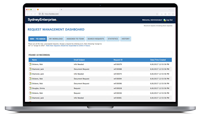Interview with the Author: Brighid Gonzales on Library Website Design
Lauren Hays
Brighid M. Gonzales recently wrote Library Website Design and Development. This book is useful for special librarians because all librarians should think strategically about their online presence. My interview with Brighid is below.
Please introduce yourself to our readers.
I am currently the systems librarian at the University of Memphis and was previously the systems and web services librarian and then the assistant director of systems and metadata at Our Lady of the Lake University in San Antonio, Texas. I earned my MLIS from San Jose State University in 2014.
Briefly summarize Library Website Design and Development.
Library Website Design and Development is a guide that leads readers step-by-step through the process of designing or redesigning a library website, from initial needs assessment to UX testing to ongoing maintenance. It includes best practices for each step in the process and provides supplemental reading suggestions for further research into the different topics covered in the book.
Why did you decide to write this book?
Library website design is a topic I am familiar with, and with which I have a lot of hands-on experience. While there are many books about various aspects of website design and development, few address the topic specifically from the perspective of library website design. In addition, there aren’t many books that cover the entire process from start to finish. I wrote this book hoping to provide web librarians with a succinct guide to lead them through a library website redesign, especially those who have never gone through the process before and are new to the subject.
How have trends in library websites changed in the last decade?
One ubiquitous thing is the inclusion of a discovery layer and a single ‘Google-style’ search box on the library’s homepage. (Most library websites now feature the main search box prominently on their homepage). There has also been more movement toward incorporating user experience design and user testing to gather feedback from actual website users and use that to determine what features and design ideas to include on the website. Website design has also become more focused on accessibility and making the website user-friendly for all users in the process.
The publisher’s description specifically mentions special librarians. Is there anything unique that special librarians should keep in mind when designing and developing a library website?
Special libraries tend to have a very specific focus, so their users will have unique and specific needs compared to the users of academic or public libraries. Special librarians need to be very familiar with their users’ wants and needs, through a combination of needs assessment and user testing, to ensure that the library website caters specifically to those needs and the unique ways that their users seek out information.
What are two things you hope all readers take away?
One is that while creativity is great and you want to design your website with a creative eye, it is important to stick to the tried-and-true elements of website design when designing any website. There are standards and conventions that are so common across the web that users expect to see them—and if your website deviates from those fundamental design rules, it can leave users confused and disoriented.
The other is that no one really knows their users’ needs and wants as well as they think they do, until they have done the research to gather that information first-hand. User needs should be at the forefront from the very beginning of the design process through to the end. A small amount of user testing can provide a great deal of insight and save a lot of time and frustration in the end, for website designers and users alike.
Is there anything else you would like to share?
Website trends are always changing and evolving but things like usability, accessibility, and consistency will always improve your design. I hope this book will provide helpful information for any libraries or web librarians currently undertaking the web design process or just looking for ways to improve their current website.
Lauren Hays
Dr. Lauren Hays is an Assistant Professor of Instructional Technology at the University of Central Missouri, and a frequent presenter and interviewer on topics related to libraries and librarianship. Please read Lauren’s other posts relevant to special librarians. Learn about Lucidea’s powerful integrated library systems, SydneyDigital, and GeniePlus, used daily by innovative special librarians in libraries of all types, sizes and budgets.
**Disclaimer: Any in-line promotional text does not imply Lucidea product endorsement by the author of this post.
Never miss another post. Subscribe today!
Similar Posts
2025 Summer Booklist: Humans & AI How Individuals Learn Joan Didion and Hidden Libraries
Each summer Lauren Hayes shares a personal reading list—and this year’s collection spans AI and education literary classics parenting reflections and bookish wanderlust.
Recent AI Developments Special Librarians Should Know About
Staying ahead of artificial intelligence advancements is a challenge. This post explores two key developments: test-time compute and OpenAI’s transformative Deep Research tool.
Growing Your Leadership Skills: 7 Tips for Special Librarians
Great library leaders aren’t born—they’re made through learning self-reflection and practice. Here are seven strategies to help you grow and lead with impact.
Keeping Up with Copyright and Generative AI: What Special Librarians Need to Know
As generative AI becomes more prevalent copyright law is evolving to address its impact. A new report from the U.S. Copyright Office provides guidance on what is (and isn’t) copyrightable.







Leave a Comment
Comments are reviewed and must adhere to our comments policy.
0 Comments